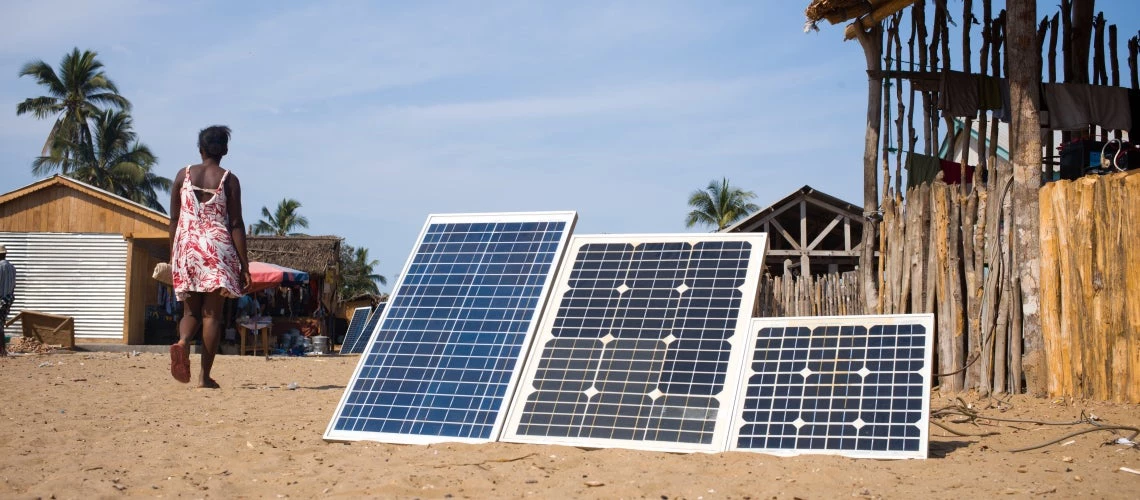 . Poverty, development and climate change need to be tackled together, acknowledging the interconnections between people, planet, and the economy
. Poverty, development and climate change need to be tackled together, acknowledging the interconnections between people, planet, and the economy
Climate change – caused by greenhouse gas (GHG) emissions from human activities – poses a major threat to people and development. Poverty, development and climate change need to be tackled together, acknowledging the interconnections between people, planet, and the economy. Climate action is a key global public good, requiring major new financing from the global community and mechanisms for inflows. Mitigation activities are needed to reduce GHG emissions in our shared atmosphere. Adaptation activities need to redouble to reduce the added hunger, migration, conflict, and trade protectionism generated by climate change.
Meeting the need for near-term increases in electricity access and production will require large global investments in electricity generation and transmission and distribution grids , as well as in technologies and innovations needed for lower carbon intensity production of electricity, steel, cement, and manufacturing. Global markets increasingly demand greener and lower-carbon content products, and the global transition also creates major opportunities to grow and export in green value chains, for countries at all income levels.
The World Bank Group is a core global hub for climate change action, enabling the private sector, and the financing of global public goods, in service of our mission to end poverty and boost shared prosperity. We provide the largest single source of financing for climate action in developing countries ($31.7 billion in FY22); channel funds from the global community - both public and private sector - through trust funds such as CIF; and maintain one of the largest bodies of climate knowledge and expertise. We also work across the World Bank Group to support policy and sector reforms, institutional capacity building, and improved investment climate to unlock opportunities for the private sector, translating into private capital enabled (PCE).
The heart of our work is to translate knowledge, expertise and commitments into impact in developing countries. We design, implement, and monitor the actual adaptation and GHG reduction projects that the global community needs for effective climate action across the developing world. This requires sound diagnostics, clear identification of impactful programs and projects, improved public policies and incentive structures, and coordination of multiple donors and funding sources – all key building blocks of our mission.
In 2022, we successfully launched our transformative new core diagnostic tool, the Country Climate and Development Reports, or CCDRs. We have already published more than 20 CCDRs, covering more than a third of the global population and GHG emissions. CCDRs are shifting the discussion from distant impacts into immediate and actionable recommendations for decision makers today. They help countries, regions and the world community prioritize the most impactful actions that can reduce GHG emissions and boost adaptation, while delivering on broader development goals.
Emerging findings from our CCDRs underscore that mitigating and adapting to climate change will be a global effort. High-income countries — with their greater share of historical emissions, higher emissions per capita, higher capacity to develop new solutions and technologies, and larger resources — must lead the way in the low-carbon transition. Major current and future emitters in the developing world also have a key role to play for the world to achieve the goals of the Paris Agreement. And almost all countries will need to increase their adaptation efforts.
In our fiscal year 2022, we provided over 35% of our direct financing through impactful climate finance. As part of COP27, we are presenting SCALE, a new umbrella trust fund for the Bank’s results-based climate finance. SCALE will provide grants for verifiable emissions reductions and aim to expand the funding sources for these activities, including from the private sector and philanthropies. It will help countries build a track record of projects and unlock private sector funding from international carbon markets. This fits squarely within our goals to provide efficient ways to pool funding from the global community for scalable projects with impact.
We have completed important new papers on financing the energy transition, methane, nature-based solutions for adaptation, and human capital. These build on our Climate Change Action Plan and drill down on key topics, such as how to address the dual challenge of providing reliable, affordable access to electricity in developing countries while reducing global GHG emissions, and how the world can finance a successful power system transition. They highlight cost-effective interventions to reduce methane emissions in the key sectors of agriculture and food, energy and sanitation and waste, and show how we are deepening our engagement for a fast mitigation sprint. They discuss how nature-based solutions can integrate development, climate and nature and how strategically combining green and grey infrastructure can maximize the benefits. Finally, they emphasize that countries will need to invest in human capital and promote gender equality to provide their people with the skills to meet the demands of the green economy and ensure a just transition for all.
Climate and development objectives can be met together with well prioritized and sequenced policy reforms and impactful projects, capable institutions, reallocation of scarce public resources, increased mobilization of private capital, and substantial financial support from the international community. This will be a truly global effort. As the World Bank Group, we are ready to do our part.


Join the Conversation